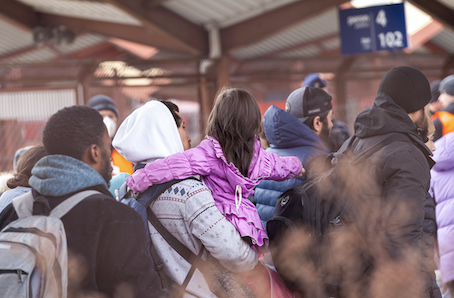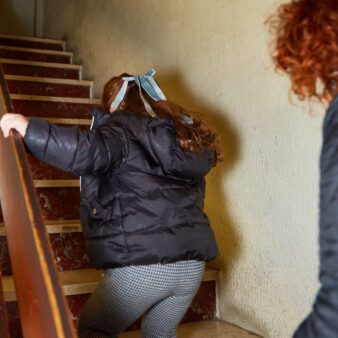
In the recent World Habitat Awards Network discussion Housing for War Refugees, Newcastle City Council (UK), METALAB (Ukraine) and Public Works Studio (Lebanon) presented a range of workable tools that municipalities and governments can use to help address the housing needs of displaced people and counter some of the potential consequences of inaction.
The problems with insecure housing
At the end of 2023, UNHCR reported an estimated 117.3 million people worldwide had been forcibly displaced. When a person loses a home, it can push them into vulnerable situations often leaving them homeless or placed in temporary accommodation and shelters.
This can have a negative impact on communities too, and puts pressure on humanitarian aid organisations, charities, municipal authorities and national governments to provide alternative housing support.
Insecure housing for refugees, asylum seekers and displaced communities can have significant social, economic and political implications for municipalities:
- Disillusionment in institutional structures. When displaced persons are unable to access housing support from the state, they may become reliant on other unelected, undemocratic structures. In the case of conflict-affected areas, this can mean a reliance on humanitarian aid structures which – while important – often deliver short-term shelter and should not replace equitable state provision.
- Long-term cost. Housing these communities in profit-driven temporary accommodation like hotels is more expensive in the long term than providing secure housing. Plus it carries the risk of pushing people into homelessness, which has significant monetary and human costs
- Social tensions. The inability to house displaced communities creates a double burden. Firstly, it hinders their integration into host communities and participation in their new environment. Secondly, they become targets for blame, often accused of straining already limited state and humanitarian resources.
The challenges of budgetary and housing cuts
Newcastle City Council is facing two big challenges: a nationwide 33% reduction in social housing since 1996 and a £384 million reduction in its budget.
The UK’s backlog in processing asylum applications is forcing a growing number of asylum seekers into poor, temporary accommodation (often hotels). This accommodation reportedly costs the UK taxpayer £8 million per day.
Policymakers are adamant about moving asylum seekers out of hotels but street homelessness among those leaving asylum accommodation in the UK has risen sharply from 44 people (July 2023) to 469 (December 2023). New and rapid changes in the Government’s asylum policies make it harder for councils to plan and move away from reactive crisis-like responses.
Councils – like Newcastle City Council – are now expecting a significant increase in housing demand. In the past year, they have seen a 475% increase in cases required to leave asylum housing. If not addressed, this could increase homelessness in the city.
The partnership solution – Newcastle City Council, UK
Newcastle City Council’s homelessness prevention model works across the public, private and charity sectors to deliver different levels of housing to meet increasing demands through periods of austerity and severe underfunding.
The charity and voluntary sector link in foodbanks, English training services and economic integration programmes while the private sector provides accommodation through landlord incentive schemes.
The Council developed more integrated and personalised responses to residents and has now launched a citywide collaboration to not just prevent but to end homelessness.
Newcastle City Council proudly refers to itself as a ‘Council of Sanctuary,’ and has demonstrated its commitment by adapting a homelessness prevention programme to support asylum seekers. It has just 0.01% of children in temporary accommodation, while the current UK national average has increased by 14% and is at its highest since 2004.
The challenges of refugee crises
Lebanon has the highest number of refugees per capita in the world and hosts about 1.5 million Syrian refugees (equivalent to ¼ of the Lebanese population).
With no municipal elections since 2022, there has been little opportunity for democratic participation on crucial housing programs for refugees, which are typically overseen by elected representatives.
Instead, Syrian refugees are facing increasing discrimination, forced eviction, and forcible deportations at the hands of local municipalities. The Israeli conflict on the Southern Lebanese border has displaced almost 100,000 people who are reliant on humanitarian aid, but state support services are limited.
Given the recurring and surrounding conflicts around Lebanon and its history as a sanctuary for refugees and displaced persons, discrimination must be addressed to protect the housing rights of non-Lebanese and Lebanese alike.
The data solution – Housing Monitor, Lebanon
Where municipal housing support is underdeveloped, Housing Monitor – a grassroots community reporting tool – provides valuable models that address refugee needs. The tool has seen a significant number of reports from Syrian refugees in precarious living conditions and/or under threat of eviction.
It responds directly to each case with legal and social support, which is particularly valuable to refugees unfamiliar with the country’s court system. It connects refugees with a social network of people facing similar issues, to create a shared knowledge-base, solidarity and support.
Housing Monitor collates housing injustices across Beirut to understand more general trends as to why these issues are occurring. These trends are then incorporated into policy recommendations presented to local authorities. The Monitor’s findings are also being used to develop a draft housing policy law for the National Government.
Additionally, Public Works Studio (the founder of Housing Monitor) presents housing rights violations through its own social media and the new Housing Justice Network, to raise awareness to local and international networks. It aims to be a constructive partner and advocate for housing rights as and when the political opportunities arise.
The challenge of war and Internally Displaced People
Ukraine’s municipal authorities had been gathering strength for almost a decade when the war with Russian began in 2022 and so were better placed to address the country’s displacement crisis.
As of December 2023, 3.7 million people are internally displaced in Ukraine with 80% of them displaced for over a year. Over 1.5 million homes have been destroyed and reconstruction and recovery costs are estimated to exceed £383 billion ($411 billion). Given the poor outlook for an end to the conflict, municipal authorities need sustainable long-term solutions to house displaced persons with dignity.
The retrofitting solution – CO-HATY Ukraine, Eastern Europe
METALAB’s CO-HATY gives IDPs a much need sense of security. The project collaborates closely with local authorities, property owners, and NGOs. It has housed 1,300 displaced persons in six buildings since 2022.
It does this by renovating soviet-era municipal buildings into emergency accommodation and managing them in partnership with local authorities and NGOs. Retrofitting and renovating is a quicker approach than building new and is a sustainable option as it reduces embodied energy.
Planning for the long-term, METALAB is now working with UNHCR and local governments in the Khmelnytskyi region to transfer vacant communal properties into the Ukrainian social housing fund. It is also working with Habitat for Humanity to develop CO-HATY into an affordable housing model.
Better outcomes for municipalities
Adopting these models could help municipalities to:
- Provide those displaced with more dignified accommodation, that is integrated with host communities, at a lower cost.
- Develop a stronger resilience to emerging crises, migrant influxes and increased housing demand through cross-sectoral partnerships.
- View housing in the medium and long-term so that refugee and asylum seeker accommodation can be adapted, re-used and transferred to accessible housing for all (i.e. social housing).
- Incorporate preventative measures so that municipalities are not bearing the costs of increased homelessness.
- Prioritise repurposing or retrofitting existing empty buildings, thereby reducing embodied carbon and preventing new construction.
- Create policies based on direct information and participatory processes, to better deliver targeted services and support.
This is not just about housing refugees, asylum seekers and displaced persons. It is thinking more structurally on the way we deliver housing to those in need so that we can create more sustainable, resilient societies. With these World Habitat awarded solutions, we have the models for better practice.
If you would like more details on any of the projects mentioned, get in touch with us.




Join the discussion